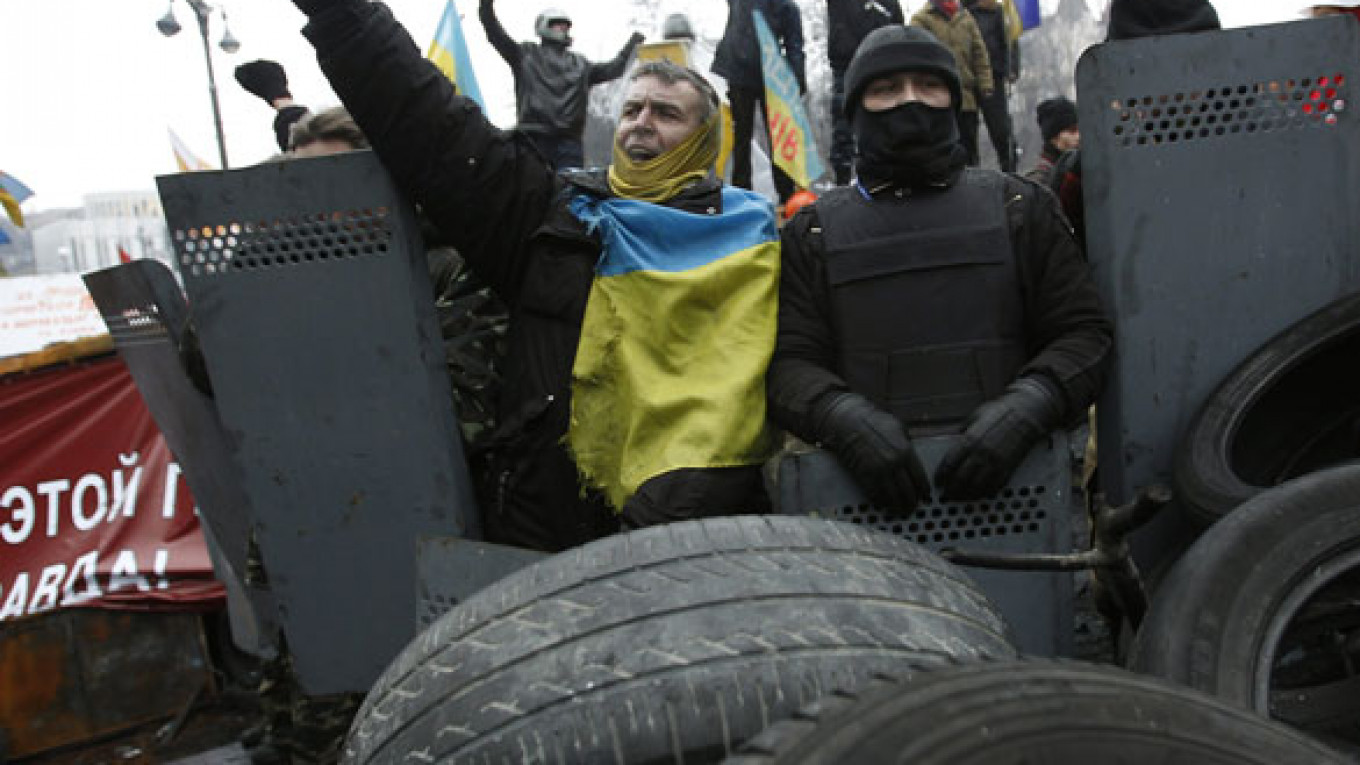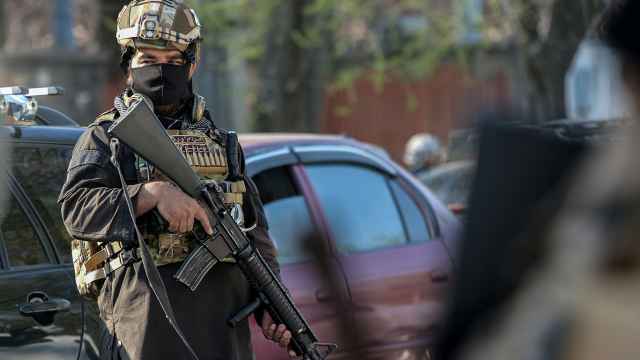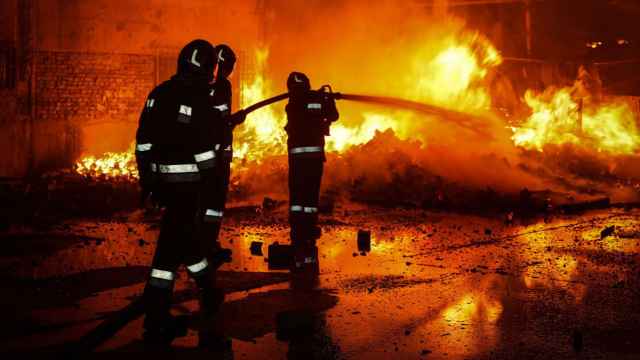When Russian anti-government activists look over the border at the political standoff in Ukraine, they can not help but feel pangs of envy.
While the anti-Kremlin protests that began in late 2011 sputtered and faded over the course of the year, with few tangible results, Ukraine's Euromaidan movement has already forced the resignation of the country's prime minister and drawn adherents willing to suffer physical punishment for their cause.
As Russian opposition activist Olga Faleyeva said, you cannot easily disperse people who are ready to face bullets.
"That is why the Ukrainian protesters will win," Faleyeva said.
The ultimate fate of the Euromaidan protests, which were sparked by Ukraine's refusal to sign an association deal with the European Union last year, is still unknown, but its participants have already shown much more resilience and willingness to oppose crackdowns than their Russian counterparts.
Riot police have clashed with demonstrators on multiple occasions since the Kiev protests began in November, and some anti-government activists have been severely beaten and even killed, yet the hostilities appear to be far from over. Protests have also spread to other parts of Ukraine.
Observers and activists from both countries have pointed to various explanations for the contrasting situations, including Ukraine's more liberal political climate and deteriorating economic condition. The Euromaidan movement, which seeks closer ties with the EU and the ouster of President Viktor Yanukovych, has also had a stronger nationalist flavor and attracted more popular support than Russia's street protests.
Faleyeva, who in December visited the permanent protest camp on Kiev's Maidan Nezalezhnosti, or Independence Square, said it helped that Ukrainian protesters had a coherent set of goals.
"The main difference is that in Ukraine most people have a clear understanding of what they want," she said. "They have a vision of the future they are fighting for."
'Civilizational Choice'
In both Ukraine and Russia, the protest movements have had various factions that do not agree on everything. But in Ukraine, the particular circumstances that led to the Euromaidan movement seem to have galvanized the different groups toward a common objective.
"[Ukraine] faces a civilizational choice between the East and the West," said Ilya Yashin, a leader of Russia's liberal RPR-Parnas party and a leading figure in the 2011and 2012 anti-Kremlin street protests.
Yashin, who also visited Kiev in December, said the Ukrainian demonstrators were waging a "national liberation war" to pursue a pro-European course, while in Russia protesters were mostly united by their weariness with one group's monopoly on power.
"They have been able to choose a mobile phone for many years but they are not allowed to choose a government," Yashin said of Russians.
Indeed, Muscovites' ability to afford their high-end mobile phones may have played a role in the decline of the anti-Kremlin movement.
Whereas the Russian movement was famously led by a so-called "creative class" of highly educated, Internet-savvy young people in a time of economic stability, Kiev's barricades appear to have drawn a more socially diverse crowd, driven partly by Ukraine's dire economic situation. As a result, Russian rallies usually attracted tens of thousands of people at most, while in Ukraine hundreds of thousands have regularly taken to the streets.
"Two chickens in the kitchen and two cars in the garage are enough for them," Faleyeva said of Russian protesters.
Political analyst Oleg Soskin, the head of Ukraine's Social Transformation Institute, said a wide range of social groups have participated in Euromaidan, including students, small and mid-sized businesses, the urban middle class, labor unions, farmers, skilled blue-collar workers and white-collar workers.
Yashin admitted that the Russian anti-Kremlin movement had thus far failed to develop a social agenda and to sufficiently attract lower-income social groups.
Fear of the Tsar
Some emphasize the differences in the two countries' post-Soviet histories as being a crucial factor in determining the fate of the two protest movements.
"In Russia, there is an inborn fear of the tsar," said Stanislav Belkovsky, a prominent Russian political analyst who used to live in Ukraine. "In Ukraine, this fear has vanished in the time since the Soviet Union fell in 1991."
Belkovsky attributed Russians' relative lack of resolve and the smaller numbers at demonstrations to this more authoritarian political culture.
In Ukraine, meanwhile, protesters have experienced victory fighting the federal government before. In 2004, a protest camp also based on Kiev's Maidan successfully undertook the Orange Revolution, which overturned a fraudulent presidential election result.
Grigory Semenchuk, a 23-year-old Ukrainian poet and protester who has visited Russia, shared Belkovsky's opinion regarding a difference in mentalities.
"The main difference is that in Russia, society is more afraid of the regime," he said. "When in Ukraine the authorities attempt to crack down on Maidan, the number of protesters doubles. In Russia everything is the other way around."
Another contrast observers point out is that the Euromaidan protests are strongly nationalist in attitude, while nationalists have remained mostly on the fringes of Russian opposition circles.
While it remains outside the mainstream, nationalism appears to be on the rise in Russia, which has seen a wave of anti-immigrant protests in recent years, including riots on Manezh Square in 2010 and in Moscow's Biryulyovo district last year. These violent events attracted a much broader base of support among lower-income groups than the mainstream protest movement.
Belkovsky said that President Vladimir Putin was afraid of nationalists precisely because they could invigorate anti-government forces.
Revolutionary Mecca
Regardless of the differences between the two protest movements, Euromaidan has served as a major inspiration for the Russian opposition.
At least four protests have been held in Russia to support Euromaidan since December, and the events in Kiev have also had an impact on recent rallies in Russia that were not devoted specifically to Ukraine.
At a protest march in support of political prisoners on Feb. 2, protesters chanted "Down with the gang," a slogan borrowed from Ukrainian protesters, and "Maidan on Manezh Square!" They carried a banner reading, "If there is no freedom, there will be a Maidan!" as well as flags of Ukraine, the EU, and the Ukrainian Insurgent Army, a nationalist guerilla group active in the 1940s.
And during a Feb. 5 hearing of the Bolotnoye case against Russian opposition activists, protesters near the court building chanted "Maidan is around the corner!" The Bolotnoye case concerns the investigation into clashes between police and protesters on Bolotnaya Ploshchad on May 6, 2012.
The Ukrainian protests also seem to have reinvigorated the use of Russia's own national symbols, including the flag and the anthem. Activist Faleyeva said she believed Russian protesters should not only use these symbols but also borrow their Ukrainian fellows' grassroots patriotism.
Russian flags were carried by protesters at the Feb. 2 march and at protests against the construction of a hotel in Moscow's Novokosino district, which have continued since December. Novokosino demonstrators' attempts to set up a permanent camp at the construction site and block the movement of a prefect's car also resembled the tactics of Ukrainian protesters.
Many Russian opposition figures have even made a kind of pilgrimage — or, in some cases, multiple trips — to the protest camp in Kiev to show their support and to learn from their Ukrainian counterparts. Boris Nemtsov, an RPR-Parnas leader who planned to go to Kiev last December, was prohibited from entering the country by the authorities.
Alexander Denisov, a Russian opposition activist who has visited Ukraine five times since December, said that he planned to set up a Russian tent on Maidan with a fellow Russian activist. He said the aim is to demonstrate that Kremlin "propaganda," which says that Euromaidan protesters hate Russians, is wrong.
Contact the author at o.sukhov@imedia.ru
A Message from The Moscow Times:
Dear readers,
We are facing unprecedented challenges. Russia's Prosecutor General's Office has designated The Moscow Times as an "undesirable" organization, criminalizing our work and putting our staff at risk of prosecution. This follows our earlier unjust labeling as a "foreign agent."
These actions are direct attempts to silence independent journalism in Russia. The authorities claim our work "discredits the decisions of the Russian leadership." We see things differently: we strive to provide accurate, unbiased reporting on Russia.
We, the journalists of The Moscow Times, refuse to be silenced. But to continue our work, we need your help.
Your support, no matter how small, makes a world of difference. If you can, please support us monthly starting from just $2. It's quick to set up, and every contribution makes a significant impact.
By supporting The Moscow Times, you're defending open, independent journalism in the face of repression. Thank you for standing with us.
Remind me later.






